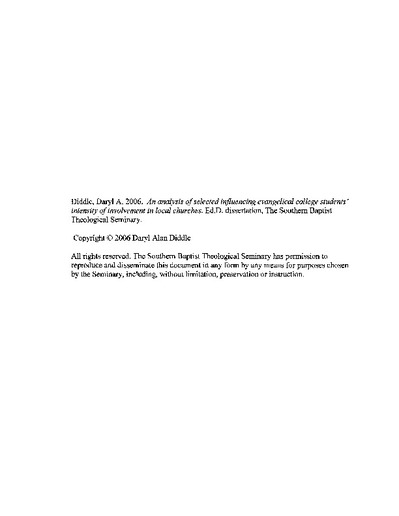| dc.description.abstract | Why do Christian college students participate, or not, in local churches while they attend Christian colleges? This study was designed to investigate and help answer this question through an analysis of selected factors that influence evangelical college students' intensity of involvement in local churches during their college years.
Because most Christian liberal arts colleges and evangelical Christian churches share the common mission of assisting in students' spiritual development, this study was designed to help these institutions in understanding the declining participation of students in local churches, according to most current research. Since one might assume that more students who attend evangelical Christian colleges would participate in local churches, the current research focused on full-time undergraduate students attending Christian College Consortium-member schools.
Several independent variables were selected and analyzed to determine if they made a significant impact upon the student's intensity of involvement. Data was gathered electronically using the Local Church Involvement Survey (LCIS), an on-line instrument created by the researcher for this study. Besides standard demographic variables, other independent variables studied included: student friendships, student relationships with ministry leaders, student leadership in church and college ministries, student opportunity for intergenerational involvement, student opportunities for ministry in church and college settings, and student perceptions of church and college commitment to students' spiritual development.
Data from 1025 surveys revealed a participation rate much higher than national averages, according to precedent literature. Nearly all of the independent variables and demographic variables studied made a statistically significant impact upon students' intensity of involvement in local churches, the exceptions being gender, classification in school, college opportunities for ministry, and housing situation. The strongest positive correlations existed between intensity of involvement and opportunity for student leadership, the student's perception that the local church genuinely cares for their spiritual growth, and the church's offering of significant ministry opportunities. The standard deviation between the LCIS scores was large and the mean and median scores were somewhat modest. | en_US |

